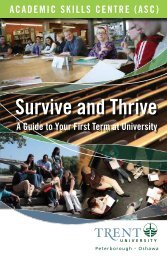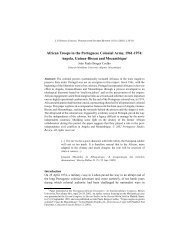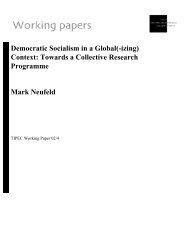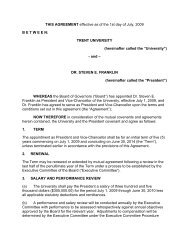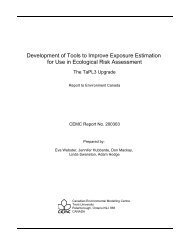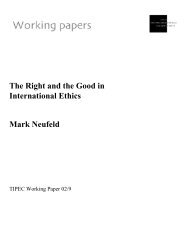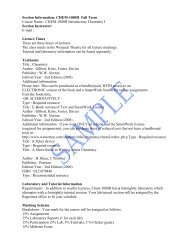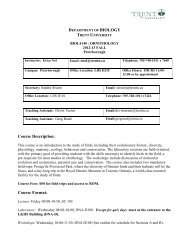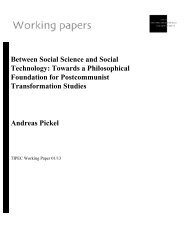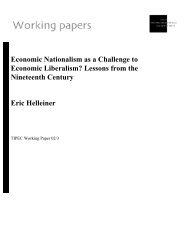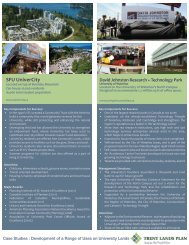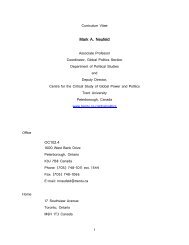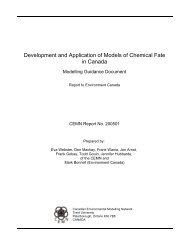Writing the essay question
Writing the essay question
Writing the essay question
Create successful ePaper yourself
Turn your PDF publications into a flip-book with our unique Google optimized e-Paper software.
Academic Skills Centre (2009)<br />
www.trentu.ca/academicskills<br />
you make into a single point of view, <strong>the</strong> result being that your argument is easier to see,<br />
and <strong>the</strong> easier it is to see, <strong>the</strong> easier it is to festoon with checkmarks.<br />
Your <strong>the</strong>sis need not be passionate or controversial. If you are asked something like,<br />
“Identify <strong>the</strong> parts of <strong>the</strong> bull- frog,” you would be thought eccentric if you took a stand<br />
on what you think those parts are: “Bull-frog parts comprise <strong>the</strong> head, <strong>the</strong> body, <strong>the</strong> little<br />
front arms and <strong>the</strong> great hind legs for jumping, by Jove, whatever <strong>the</strong> enemies of truth<br />
might preach.” But you still need a <strong>the</strong>sis, in <strong>the</strong> sense of an organizational principle from<br />
which to develop your answer. In this case, <strong>the</strong> <strong>the</strong>sis statement might be, “The parts of<br />
<strong>the</strong> bull-frog may be divided by <strong>the</strong>ir three different functions: leaping, croaking, and<br />
breeding, each of which involves several parts.” It ain’t poetry, but it does answer <strong>the</strong><br />
<strong>question</strong> directly and indicate <strong>the</strong> way in which you intend to organize your answer.<br />
If you do not have an immediate stance to take in response to <strong>the</strong> <strong>question</strong>, jot down <strong>the</strong><br />
points that come to mind on <strong>the</strong> subject and <strong>the</strong>n ask yourself, “What overall position do<br />
my ideas point towards?” For example, you must answer <strong>the</strong> <strong>question</strong>, “Evaluate <strong>the</strong><br />
success of <strong>the</strong> CCF,” and you do not have a deeply felt opinion on <strong>the</strong> subject. List <strong>the</strong><br />
pros and cons, since you are being asked to assess something.<br />
PROS<br />
- social programs: U.I.C., Medicare,<br />
Pensions, Occupational Health & Safety<br />
- civil rights<br />
- mass membership<br />
- popular leaders<br />
- support of trade unions & extra<br />
parliamentary groups<br />
- prairie strength, Western Prov's<br />
CONS<br />
regionalism<br />
never formed a national government<br />
few large donors<br />
ambitious goals (costly)<br />
lack of support from Central & Eastern<br />
Prov's.<br />
Okay. so <strong>the</strong> CCF was successful in some terms, not in o<strong>the</strong>rs. Compose a <strong>the</strong>sis<br />
statement that reflects what information you are capable of presenting on <strong>the</strong> subject,<br />
even though it seems to be a bit of a hodge-podge: social programs, civil rights, electoral<br />
record, party history. Here’s one:<br />
The CCF did not achieve <strong>the</strong> original ambitious goals on which it was founded, and never<br />
formed a federal government, but it was successful in entrenching most of its social<br />
service and civil rights policies into Canadian government.<br />
The cleverly-worded <strong>the</strong>sis will constellate disparate elements into one integrated point<br />
of view, and thus give <strong>the</strong> Grateful Examiner a way of reading your answer as <strong>the</strong> logical<br />
development of a sensible <strong>the</strong>sis, not <strong>the</strong> grab-bag of isolated points that it might have<br />
seemed o<strong>the</strong>rwise.<br />
Be as specific as possible. Most exam <strong>essay</strong> <strong>question</strong>s will address general course<br />
<strong>the</strong>mes, issues that anyone who attended <strong>the</strong> lectures would be familiar with. To excel on<br />
an exam, <strong>the</strong>refore, you must establish that you are not merely acquainted with <strong>the</strong>se<br />
From Making your Mark: Learning to Well on Exams.<br />
Ca<strong>the</strong>rine Taylor, Hea<strong>the</strong>r Avery and Lucille Strath: ASC, Trent U. (1994).



